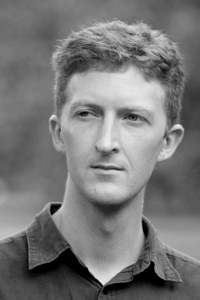
Benjamin Morris
A chilly Thursday night. Tulane’s auditorium was full, the lights already dimmed, the audience alert, the staff restive and ready to start the show, but moments before the host began the evening’s introductions, a fire alarm suddenly sounded.
The crowd emptied onto the street, spilling out the doors to form a loose, nervous assemblage on the sidewalks, huddling together for warmth, unsure whether the show would go on. Staff members brandished their phones, receiving vague assurances from the authorities. Someone called out, to laughter, “Let’s just do it out here!” Precious minutes slipping away, the honored guest shrugged as if to say, sure, why not?
Yet when the host finally received the all-clear, and the crowd streamed back inside the auditorium, the room was – somehow – even more tightly packed than before.
And they say that poetry makes nothing happen.
Our local universities play a central role in supporting the arts, providing opportunities to hear from poets laureate and undergraduates alike. This past Thursday, Tulane hosted Naomi Shihab Nye, an Arab-American poet and the author of over two dozen critically-acclaimed anthologies and collections of poetry. Once the false alarm had finally been extinguished, Nye started a few fires of her own on stage, reading works that ranged from the acutely personal to the passionately political. In so doing, Nye made the argument that poetry is not just an art form that exists on the margin of our consciousness. On the contrary, she claimed, poetry is an art that sharpens our consciousness, expanding both our aesthetic and our moral sensibilities.
Take, for instance, this passage from her poem “Maximum Security,” written with a group of men in a high-level detention facility who enrolled in a writing workshop with her. “How beautiful they were, / in their same suits, a crowd of men you knew / would help if you were falling, / someone pushed you down. How every one of us has / a hundred ways we could go wrong / and they are very close by.” In willfully closing this distance with her subjects, by the end of the poem the speaker comes to understand her own proximity to error, identifying with their shared frailty. Such is the human connection that poetry affords, and the basis of William Carlos Williams’ famous observation that: “It is difficult / to get the news from poems / yet men die miserably every day / for lack / of what is found there.”
* * *
The abundance of poetry was joined at the Uptown table by a second feast: of solid storytelling. In a slightly more intimate setting than Nye’s appearance a few nights later, the authors Nathaniel Rich and John Jeremiah Sullivan read from their works at Octavia Books (the second stop on a brief tour, after a reading at the Antenna Gallery in the Bywater the previous night). Rich read from a work of fiction about the oldest-living man in the world, drawing appreciative laughter and, later, questions from the crowd. On being asked what the ostensible secret to longevity was, Rich shrugged, and offered this point of basic advice: “Keep breathing,” he said.
Sullivan, whose new collection of essays, Pulphead, has just been published, read excerpts from an essay about an obscure nineteenth-century French naturalist named Rafinesque whose colorful life could have only come from a novel, had not it all been true. Rafinesque corresponded with Thomas Jefferson, ‘herborized’ with John James Audubon, invented a fictional Native American language that until recently was considered genuine by scholars, and quite possibly cursed Transylvania University in Kentucky, resulting in its later destruction by fire. He also, Sullivan noted, anticipated a number of Darwin’s later theories, a point of scientific history that has only recently been redressed.
* * *
Science, history, biography, politics, aesthetics – all in a week’s work. On reflecting on this cultural bounty, I’m reminded of something William Faulkner once said. Asked by an interviewer whether he preferred bourbon to Scotch whiskey, “I ain’t that particular,” Faulkner replied. “Between Scotch and nothing, I’ll take Scotch.” Looking back at this past week, between poetry and prose, how nice it is that we don’t have to choose.
What’s next? This week, I’ll be checking out the brand-new Pop-Up Art Gallery currently on Maple Street, and the Invisible Man exhibition (a Prospect.2 satellite show) at the McKenna Museum of African American Art. Hope to run into some of you there.
Benjamin Morris is a writer and researcher whose work – poetry, fiction, plays, and essays – appears in a range of publications in the United States and Europe. Around town, he can be found catching music on Frenchmen, crawling the galleries on St Claude, playing soccer in City Park, or occasionally tending bar at the Sovereign Pub Uptown. More information about his work is available at benjaminalanmorris.com. His column appears on Sundays.
This Benjamin character is gonna go far, I tell ya.
William Faulkner also said something to the effect that “A man should not mess with booze until he’s 50, and then he’s a damn fool if he doesn’t.”